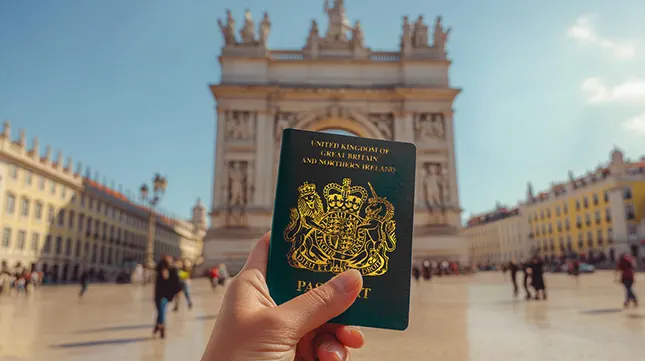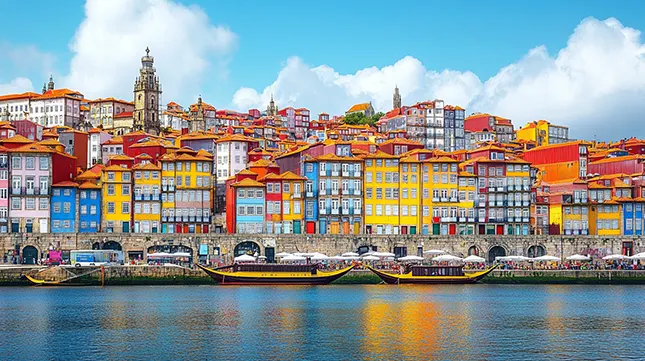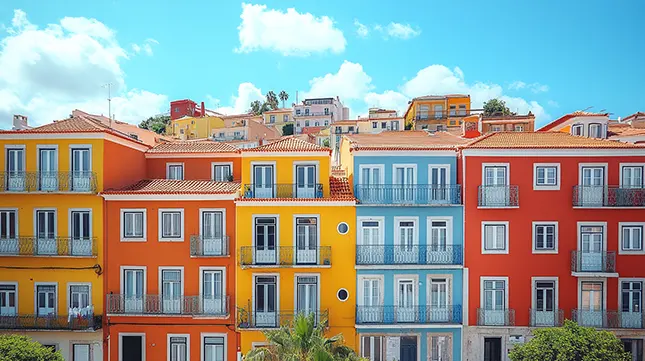Thinking about swapping rainy skies and rush hour traffic for sunshine and sea views?
Portugal continues to rank as one of the most popular relocation destinations for Brits seeking a better quality of life.
With its warm climate, friendly locals and low-cost, laid-back standard of living, it’s not hard to see why. Whether you’re drawn by the slower pace of life, the coastal charm of the Algarve, or the thriving cities like Lisbon and Porto, Portugal offers something for everyone.
As a bonus, English is widely spoken in many parts of the country, especially in tourist-friendly regions, making it easier for newcomers to settle in.
For families, retirees, and digital nomads alike, Portugal ticks a lot of boxes.
Plus, Portugal still offers attractive tax benefits and residency pathways for UK nationals post-Brexit, making the move is more feasible than ever.
Before packing your bags, here’s everything you need to know — from visas and cost of living to healthcare and schools.
Residency and Visas After Brexit

Post-Brexit, UK citizens no longer have automatic freedom of movement in the EU.
However, Portugal has made the transition relatively straightforward. You can stay up to 90 days in any 180 days without a visa.
For anything longer, you’ll need a residence permit. One popular route is the D7 visa, ideal for retirees or remote workers with a steady income.
Another option is the Golden Visa, which allows residency through investment.
As of March 2025, the Portuguese Government is reviewing this.
Once in Portugal, you’ll register with the SEF (Foreigners and Borders Service).
Processing times can vary, so it’s best to start the application process well in advance.
You will need proof of income, health insurance, and accommodation.
Once approved, you will access healthcare, education, and the right to live and work in Portugal.
Planning and staying informed will make your move much smoother.
Cost of Living: Portugal vs UK

One of the main reasons Brits relocate to Portugal is the lower cost of living.
Most essentials, from groceries to rent, are considerably cheaper than in the UK.
For example, a one-bedroom apartment in Lisbon’s city centre averages around €1,200 (£1,000) per month, compared to over £2,000 in central London. With homes outside of cities and large towns being considerably lower.
Dining out is affordable, with prices as low as 75% cheaper in Portugal. A three-course meal for two at a mid-range restaurant typically costs around €45 or £37.
Utility bills are also lower in Portugal, especially in the south, where heating isn’t a major concern. You can expect to pay around 150% less for them.
Groceries and fuel have seen recent price rises, but Portugal still offers excellent value overall.
You’ll also benefit from lower council taxes and no TV license fees.
The Numbeo website is a helpful tool for comparing living costs city by city or country by country.
This affordability makes Portugal especially attractive to retirees, young families, and remote workers who want to make their money go further without sacrificing lifestyle quality.
A Climate Made for Outdoor Living

For many UK expats, the lure of Portugal’s sunshine is hard to resist.
The country offers one of the sunniest climates in Europe, delivering an outdoor lifestyle that’s worlds apart from the grey skies back home.
Portugal enjoys a Mediterranean climate, but it’s far from one-size-fits-all.
Along the Algarve coast, expect over 300 days of sunshine a year and mild winters that rarely dip below 10°C, perfect for golf, hiking, or a seaside stroll in January.
Head inland or north to cities like Porto, and you’ll find cooler, wetter winters, but still far gentler than the UK’s.
Spring is pleasantly warm and ideal for alfresco dining and countryside walks. Summer brings long, hot days often topping 30°C, especially in the interior.
Autumn stays comfortably warm into November, making it a favourite for late-season getaways.
For accurate forecasts and regional updates, visit http://www.ipma.pt/en/index.html or www.weather.com.
Best Places to Live in Portugal

Finding the right location can take some time if you are unfamiliar with Portugal.
However, the right location is key to the success of your relocation.
You will very quickly realise that Portugal offers a variety of settings depending on your preferred lifestyle and budget.
With its golden beaches and British expat communities, the Algarve remains a top pick.
Meanwhile, towns like Lagos, Albufeira, and Tavira offer sun, sea, and an easy pace of life.
Lisbon, Portugal’s capital, is vibrant and cosmopolitan, appealing to professionals, international students and creatives.
It boasts a strong tech scene, cultural events, and excellent public transport.
For a slightly more affordable option with plenty of charm, Porto, Portugal’s second-largest city offers riverfront living and a growing digital nomad community.
The Silver Coast towns like Nazaré, Caldas da Rainha, and Óbidos are hidden gems if you prefer peace and nature. The Alentejo region is perfect for those seeking a slower, rural lifestyle.
For more information, explore the Portugalist website. They have produced an article highlighting 12 of the country’s most expat-friendly locations.
Portuguese Property Market

Portugal’s property market remains one of Europe’s most attractive, especially for international buyers.
As of February 2025, average property prices have increased by 8.9% year-on-year, with hotspots like Alto Alentejo seeing a sharp 26.3% surge, making it one of the fastest-growing regions in the country.
Traditional favourites such as Lisbon, Porto, the Algarve, and Madeira continue to command strong interest, driven by demand from both local and foreign buyers.
Urban centres offer sleek apartments and modern developments, while rural and coastal areas boast character homes, farmhouses, and villas with sweeping views.
Whether you’re after a contemporary city base or a peaceful countryside retreat, Portugal caters to every taste and budget.
It’s wise to engage a licensed real estate agent who understands local regulations and market trends.
To browse properties and get a really good idea of how far your money will stretch in Portugal, visit these popular on-line property sites:
While homes along the country’s stunning coast are always in demand, they come at a high price there are many locations where you can buy a home that doesn’t break the bank.
Take a look at this interesting article listing 25 of the cheapest places to buy a home in Portugal.
7-Point Quick Guide to Buying a Home in Portugal

UK expats without permanent residency can buy property in Portugal.
There are no restrictions on foreigners owning property, whether you’re a resident or not.
Portugal has long welcomed overseas buyers, and British nationals continue to make up a significant portion of the market.
With the help of a good estate agent and property lawyer, the whole house-buying process is fairly straightforward.
Here is our easy step-by-step guide:
1. Get a Portuguese NIF Number: You’ll need a Número de Identificação Fiscal (NIF) to buy property. Apply at a local tax office or through a lawyer.
2. Open a Portuguese Bank Account: Required for paying taxes, fees, and mortgage payments. Visit the Portugalist website for a full explanation.
3. Appoint a Property Lawyer: Hire an English-speaking solicitor to review contracts and handle paperwork. Make sure they’re registered with the Portuguese Bar Association.
4. Secure Financing (if needed): Some banks offer mortgages to non-residents, and the process is surprisingly easy. Find out more here.
5. Make an Offer: Once accepted, a Promissory Contract (Contrato de Promessa de Compra e Venda) is signed, and a deposit (usually 10%) is paid.
6. Final Deed Signing: The purchase is completed at a notary’s office,e and the property is officially registered in your name.
7. Register the Property: Ensure it’s recorded at the Land Registry (Conservatória do Registo Predial)
Renting a Home in Portugal

For many UK expats, renting is the first step toward settling in Portugal.
It provides flexibility while you explore your surroundings and decide on a long-term base.
Rental prices vary by region, with Lisbon and Porto commanding the highest rates, expect to pay upwards of €1,200/£1000 month for a central one-bedroom apartment.
You can still find well-maintained homes in smaller towns or inland regions from as little as €500/£417month.
The rental process is typically straightforward, with many landlords open to short- or long-term contracts.
Demand for rental homes has increased in recent years, particularly in coastal areas and digital nomad hotspots, so it’s best to begin your search early.
Here again, real estate agents can help match you with properties that meet your needs, offering up-to-date listings nationwide to suit all budgets and lifestyles.
About Healthcare in Portugal

Portugal offers a solid public healthcare system (SNS) funded through taxes and social security.
Once you’re a legal resident and have a NIF number and Social Security registration, you can access public services at low or no cost.
Some groups, like pensioners or those on low incomes, may be eligible for free or subsidised care.
However, many expats choose private health insurance to avoid waiting times and access a wider range of specialists.
Private policies are affordable and widely used alongside the public system.
For full access to the SNS, you’ll need to register at your local health centre (Centro de Saúde).
Private options are available via providers like International Citizens Insurance and Bupa.
For further guidance, check the UK government’s healthcare info for Portugal.
Building a Career in Portugal

Portugal might be a favourite among retirees, but it’s also attracting career-minded Brits keen to enjoy the sunshine and a slower pace of life without giving up work.
As a non-EU citizen, you’ll need a valid work visa before starting employment.
Fortunately, sectors like tourism, healthcare, agriculture, and tech are actively seeking skilled professionals — particularly English speakers.
To begin your search, check the national job portal run by the Institute for Employment and Vocational Training (IEFP).
Remote work has also opened doors for expats in roles like digital marketing, IT, design, and customer service. If you have an EU-based employer or clients, Portugal’s D8 Digital Nomad Visa might be a viable route.
Alternatively, Portugal has a “Shortage Occupations list”.
Take a look and see if your particular skills are in demand currently.
Although speaking Portuguese helps, especially in local businesses, English is widely accepted in tourism and tech.
Networking, joining local expat business groups, and connecting with recruiters can all improve your chances of landing the right role.
With time and patience, there is no reason why you can find gainful employment in your preferred sector.
Exploring Student Life and Learning in Portugal

Portugal is fast becoming a go-to destination for international students, with nearly 75,000 already calling it home.
From buzzing student life to globally respected degrees, the country blends academic credibility with a lifestyle few can match.
Top institutions like the University of Lisbon and University of Porto offer a wide range of undergraduate and postgraduate courses, many of which are taught in English — especially in areas like business, engineering, and international relations.
Here’s how to get started:
- Pick a university and course: Use https://www.studyinportugal.edu.pt to explore your options.
- Apply: Undergraduates apply via the Candidatura Online portal; postgraduates apply directly to the university.
- Prepare your documents: This includes transcripts, a passport, language certificates, and a motivation letter.
- Visa and arrival: Apply for a student visa at your local Portuguese consulate, then secure your residence permit within 90 days of arriving.
Plan accommodation and budget early tuition fees vary, but living costs are generally lower than in the UK.
Whether you’re pursuing a full degree or just a semester abroad, studying in Portugal offers more than just qualifications, it’s a chance to experience vibrant culture, sunshine, and a welcoming international community.
With the right planning, you’ll soon find yourself thriving both in the classroom and beyond.
Understanding Tax in Portugal

Sorting your taxes may not be the most exciting part of relocating, but getting it right can save you time, money, and headaches.
The good news? The UK and Portugal have a double tax treaty, so you won’t pay tax on the same income in both countries.
Once you become a tax resident in Portugal (by spending more than 183 days a year), you must declare your worldwide income to the Portuguese tax authority.
Non-residents are only taxed on Portuguese income, usually at a flat rate of 28%.
You’ll need a NIF (Número de Identificação Fiscal) to pay taxes, rent long-term, buy property, or even open a bank account. You can apply at your local tax office or through a lawyer.
Many UK expats also benefit from the Non-Habitual Residency (NHR) scheme, which offers tax incentives for up to 10 years.:
Using the services of a local tax advisor can help you navigate both systems smoothly and negate any unnecessary and costly pitfalls.
Smart Currency Transfers: Making Your Money Go Further
Moving to Portugal means dealing with currency exchange, and getting it right can make a big difference.
Whether you’re transferring funds to buy property, a car or to cover living costs, or set up a business, exchange rates can significantly impact your budget.
Instead of relying on high-street banks (often offering less competitive rates and hidden fees), many expats turn to foreign exchange specialists for better value and peace of mind.
Services like Currencies Direct offer more favourable rates, low or no transfer fees, and expert guidance especially useful when transferring large sums.
Even a small percentage difference in rates can translate to thousands of pounds saved when purchasing a home.
Planning ahead helps you make the most of every pound you move abroad
Portuguese Import Custom Regulations

Planning to move your household goods to Portugal?
It is good to know that you can bring your personal items duty-free as long as they’ve been owned and used for at least six months and are clearly for personal use.
To qualify for customs exemption, you’ll need to provide:
- A full inventory list in Portuguese with estimated values
- Your Portuguese NIF (tax number)
- A valid passport
- Proof of Portuguese residence (e.g. rental agreement or utility bill)
- A change of residence certificate if arriving from outside the EU
Keep in mind that shipments can be inspected.
Items like alcohol, tobacco, or anything brand-new may be subject to import duties.
If you’re moving from a non-EU country, ensure your goods arrive within 12 months of your residency approval.
Visit the FIDI website to download an up-to-date customs guide for Portugal
And don’t forget, a trusted removals company such as R.H. Pardy can help ensure your paperwork is in order and your shipment arrives smoothly.
Why Choose R.H. Pardy for Your Move to Portugal?

When relocating abroad, choosing the right removals partner can make all the difference.
With decades of experience and a reputation built on trust, R.H. Pardy specialises in seamless international moves door to door, including expert shipping of personal belongings to Portugal.
Our team understands the ins and outs of customs regulations, ensuring your household goods arrive safely, legally, and on time.
From packing and paperwork to delivery at your new home, we handle every detail with care, so you can focus on the adventure ahead.
As proud members of industry-leading organisations like BAR and IAM, we adhere to the highest standards of professionalism and customer service.
Whether you’re moving a few boxes or an entire household, you can rely on R.H. Pardy for a stress-free no-fuss experience.
Get in touch today to start planning your move.




